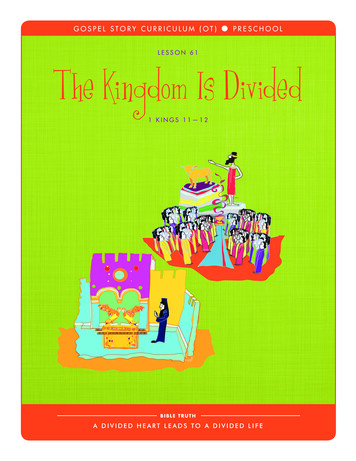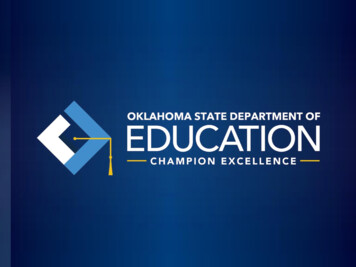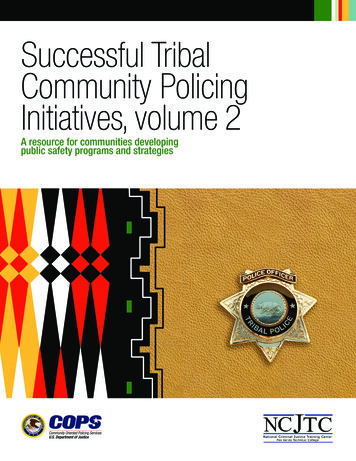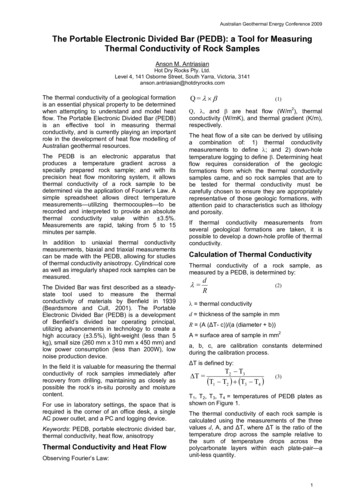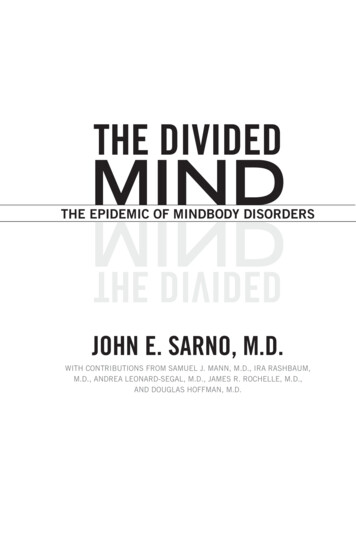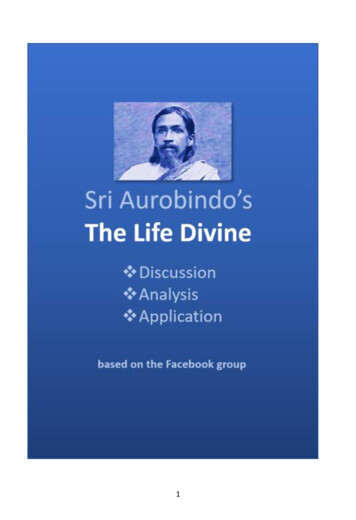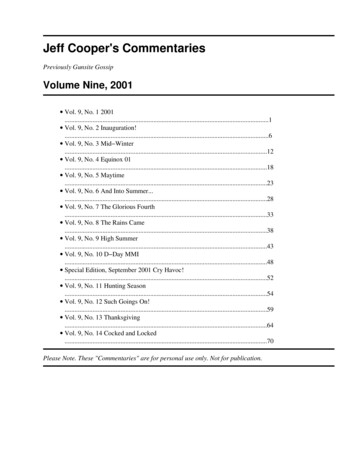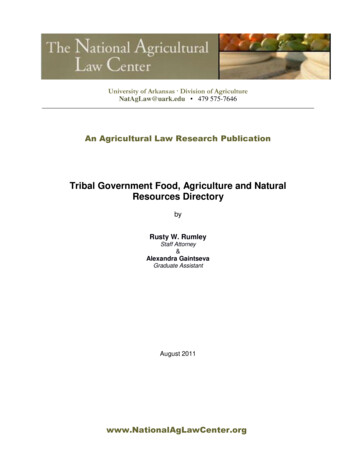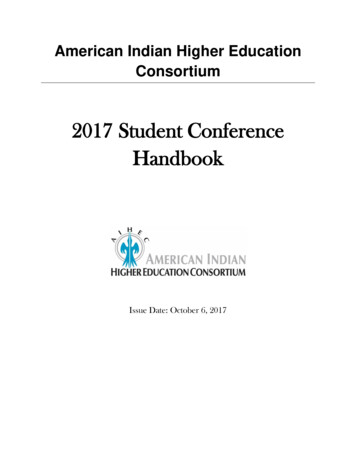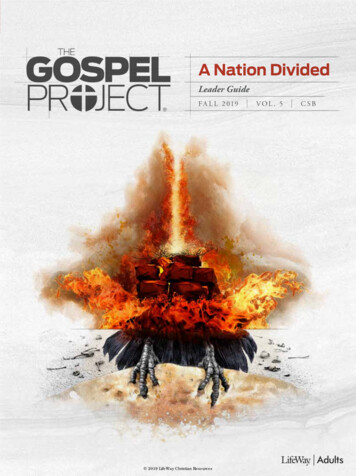
Transcription
A Nation DividedLeader GuideF A L L 2 019 2019 LifeWay Christian Resources VOL . 5 C SB
God’s Word to YouA Summary of the BibleIn the beginning, the all-powerful, personal God created the universe.This God created human beings in His image to live joyfully in His presence,in humble submission to His gracious authority. But all of us have rebelledagainst God and, in consequence, must suffer the punishment of ourrebellion: physical death and the wrath of God.Thankfully, God initiated a rescue plan, which began with His choosing thenation of Israel to display His glory in a fallen world. The Bible describes howGod acted mightily on Israel’s behalf, rescuing His people from slavery andthen giving them His holy law. But God’s people—like all of us—failed torightly reflect the glory of God.Then, in the fullness of time, in the Person of Jesus Christ, God Himselfcame to renew the world and restore His people. Jesus perfectly obeyed thelaw given to Israel. Though innocent, He suffered the consequences of humanrebellion by His death on a cross. But three days later, God raised Him fromthe dead.Now the church of Jesus Christ has been commissioned by God to take thenews of Christ’s work to the world. Empowered by God’s Spirit, the churchcalls all people everywhere to repent of sin and to trust in Christ alone forour forgiveness. Repentance and faith restores our relationship with God andresults in a life of ongoing transformation.The Bible promises that Jesus Christ will return to this earth as theconquering King. Only those who live in repentant faith in Christ willescape God’s judgment and live joyfully in God’s presence for all eternity.God’s message is the same to all of us: repent and believe, before it is too late.Confess with your mouth that Jesus is Lord and believe with your heart thatGod raised Him from the dead, and you will be saved. 2019 LifeWay Christian Resources
Table of Contents uggested forSthe week ofUnit 13: God Speaks to His People (1–2 Kings)September 16Session 1The Pictures of God’s AuthoritySeptember 818Session 2The Signs of God’s PresenceSeptember 1530Session 3The Gifts of God’s PowerSeptember 2242Session 4The Visions of God’s StrengthUnit 14: God Judges the Sin of His People (2 Kings; Prophets)September 2954Session 1A Rebellious People Receive MercyOctober 666Session 2An Unfaithful People Receive LoveOctober 1378Session 3An Idolatrous People Receive JudgmentUnit 15: God Shows Mercy to His People (2 Chronicles; Prophets)October 2090Session 1God Promises a Suffering ServantOctober 27102Session 2God Receives the People’s RepentanceNovember 3114Session 3God Declares a New CovenantNovember 10126Session 4God Answers a Confused ProphetNovember 17138Session 5God Disciplines a Rebellious PeopleNovember 24150Session 6God Pictures a Future HopeCover Art Explanation1. Ravens provided Elijah with bread, and meat, as he hid from King Ahab (Unit 13, Session 1)2. Elijah’s face-off with the prophets of Baal resulted in the Lord sending fire from heavento consume the sacrifice and the altar itself, demonstrating the Lord is the one true God(Unit 13, Session 2)3. The fire is also representative of the Lord’s spiritual forces, specifically chariots and horsesof fire, witnessed at Elijah’s departure from earth and present for Elisha’s protection(Unit 13, Sessions 3-4)4. Dry bones in the valley from Ezekiel’s vision (Unit 15, Session 6)3 2019 LifeWay Christian Resources
A Word from the EditorThe Gospel Project Adult Leader Guide CSBVolume 8, Number 1 Fall 2019Ed StetzerFounding EditorTrevin WaxGeneral EditorBrian DembowczykManaging EditorDaniel DavisContent EditorJosh HayesContent and Production EditorKen BraddyManager, Adult Ongoing Bible StudiesMichael KelleyDirector, Groups MinistrySend questions/comments to:Content Editor by email todaniel.davis@lifeway.com or mail toContent Editor, The Gospel Project:Adult Leader Guide, One LifeWay Plaza,Nashville, TN 37234-0175;or make comments on the Web at lifeway.com.Printed in the United States of AmericaTrevin WaxGeneral Editor—The Gospel ProjectAuthor of multiple books, includingThis Is Our Time: Everyday Myths in Light of the GospelThe prophetic books of the Old Testament can beconfusing, both to the newcomer to the Bible and thelongtime reader. Where do these prophets fit in the overallnarrative of Israel and Judah? What messages did theycommunicate? What was God doing in and through theirwork? The benefit of this volume of The Gospel Project isthat it gives you a glimpse of the prophets right at the pointtheir message was going forth to God’s people. We canask questions of God with Habakkuk, look forward to thecoming Suffering Servant with Isaiah, stand amazed atthe stunning picture of relentless love in Hosea, and learnsomething of God’s extravagant love with Jonah.As you work through the sessions in this volume, keepan eye on all the different ways God reveals Himself andcommunicates His messages of judgment and grace. Fall toyour knees in awe, and then stand up and boldly proclaimthe love of this great God, who inspired the prophets todeliver His word.The Gospel Project : Adult Leader Guide CSB(ISSN 2163-0917; Item 005438061) is publishedquarterly by LifeWay Christian Resources, OneLifeWay Plaza, Nashville, TN 37234, Thom S. Rainer,President. 2019 LifeWay Christian Resources.For ordering or inquiries, visit lifeway.com, orwrite LifeWay Resources Customer Service, OneLifeWay Plaza, Nashville, TN 37234-0113. For bulkshipments mailed quarterly to one address, emailorderentry@lifeway.com, fax 615.251.5933, or writeto the above address.We believe that the Bible has God for its author;salvation for its end; and truth, without anymixture of error, for its matter and that allScripture is totally true and trustworthy. Toreview LifeWay’s doctrinal guideline, please visitwww.lifeway.com/doctrinalguideline.All Scripture quotations are taken from the ChristianStandard Bible , Copyright 2017 by Holman BiblePublishers. Used by permission.EDITOR4 2019 LifeWay Christian Resources
About the WritersTony Merida (unit 13, sessions 1-4) is Pastor for Preachingand Vision of Imago Dei Church in Raleigh, North Carolina.Tony has an extensive itinerant ministry and has writtenseveral books, including The Christ-Centered Expositor andeight volumes in the Christ-Centered Exposition commentaryseries. He is happily married to Kimberly, and they have fiveadopted children.Whitney Putnam (unit 15, sessions 1-3) serves as theMinistry Engagement Director at Stonecroft, an internationalwomen’s ministry. She is pursuing her Masters degree atMidwestern Baptist Theological Seminary. She loves servingwith her husband at their little church and teaching her threelittle girls they can be world-changers of their own.Blake Ring (unit 15, sessions 4-6) serves as the Pastor ofMissions and Small Groups at Ninth & O Baptist Church inLouisville, Kentucky. He is married to Lydia, and they haveone son, Will, and four daughters, Riley, Emery, Hadley,and Ainsley. He earned a PhD from The Southern BaptistTheological Seminary, where he serves as an adjunct professor.Halim Suh (unit 14, sessions 1-3) and his wife, Angela,have four kids and live in Austin, Texas, where he is Pastorof Teaching and Theology at The Austin Stone CommunityChurch. He co-authored two Bible studies with Matt Carter:Creation Unraveled and Creation Restored. Halim earned anMDiv from Southwestern Baptist Theological Seminary.WRITERS5 2019 LifeWay Christian Resources
Unit 13, Session 1The Pictures ofGod’s Authority1Summary and GoalDuring the time when the nation of Israel was divided politically into two nations,Judah and Israel, these nations were also divided spiritually, worshiping idols insteadof the one true God. So the Lord raised up prophets to speak His truth to His peopleand to call them to repentance. One such prophet was Elijah, whose name meant“My God is Yahweh.” He spoke on behalf of God, performed miracles in God’spower, confronted rebellious kings, and challenged the people to worship only theLord. Though he was a human being like us, he performed many great wonders andprovided the template for the one who would precede the coming Messiah, to whomhe also pointed through his faithful and miraculous ministry.Session Outline1. God provides in unusual ways (1 Kings 17:1-4).2. God provides in miraculous ways (1 Kings 17:10-16).3. God provides through His servant (1 Kings 17:17-24).Background Passage: 1 Kings 17Session in a SentenceGod’s miracles reveal He is the one true God.Christ ConnectionThe miracles Elijah performed revealed that he was a prophet of the one true Godand that the Lord’s words were true. In a greater way, the miracles Jesus performedrevealed that He is the Son of God, the true Word of God (John 20:30-31).Missional ApplicationBecause we have come to know Jesus as the Word of God and have been forgivenand transformed by Him, we declare God’s Word to those around us with faith andboldness so that God may move others from death to life.6Date of My Bible Study: 2019 LifeWay Christian Resources
Group TimeIntroductionGROUP MEMBER CONTENTGroup content found in theDaily Discipleship Guide isincluded in this shaded areathroughout the session.READ: Share the author’s comparison on page 11 in the Daily Discipleship Guide (DDG) between HappyMeals and the miracles recorded in the Bible.When my kids were younger, they often wanted to eat at McDonald’s because theywanted a Happy Meal . They enjoyed the food, but they loved the cheap toy inside evenmore. Now, however, my kids are older, and they never ask me to pull into McDonald’sfor a Happy Meal. Now they want steak! They have grown up. The Happy Meal daysare gone.Some people today look at the miracles in the Bible like Happy Meals—to be cherishedas children but not as adults. The skeptics believe you should grow up and see thesebiblical stories as fictional. But should we discard the miracle stories of Scripture?INTERACT: Ask group members the following question.What beliefs and doctrines are affected when a person rejects thevalidity of miracles in the Bible? (potentially God’s existence; God’somnipotence; God’s immanence and involvement in His creation; theinerrancy and trustworthiness of Scripture; the power of the gospel tosave sinners through faith in Jesus’ death and resurrection)SAY: If we don’t take the miracle stories of the Bible as being historically accurate, then by extension we cannottake the Gospels’ record of Jesus’ ministry as historically accurate either. Jesus Himself understood the OldTestament stories as truthful accounts, not fictional morality tales. In fact, He believed the miracles of the OldTestament prophets pointed forward to His own ministry, miracles, sacrifice, and redemption.SUMMARIZE: In this session, we will examine the beginning of the prophet Elijah’s ministry. He spoke onbehalf of God, performed miracles in God’s power, confronted rebellious kings, and challenged the people toworship only the Lord. Though he was a human being like us, he performed many great wonders and pointed tothe coming Messiah through his faithful and miraculous ministry.For session-by-session training videos, please visit MinistryGrid.com/GospelProject.For additional teaching options and other resources, please visit GospelProject.com/additional-resources.Unit 13, Session 1 2019 LifeWay Christian Resources7
Point 1: God provides in unusual ways (1 Kings 17:1-4).READ 1 Kings 17:1-4 (DDG p. 12).Now Elijah the Tishbite, from the Gilead settlers, said to Ahab, “As the Lord Godof Israel lives, in whose presence I stand, there will be no dew or rain during theseyears except by my command! ”2Then the word of the Lord came to him: 3 “Leave here, turn eastward, and hideat the Wadi Cherith where it enters the Jordan. 4 You are to drink from the wadi.I have commanded the ravens to provide for you there.”1EXPLAIN: Use the first paragraph in the DDG (p. 12) to set the political and spiritual context for the droughtthat God would send on Israel through the word of Elijah.During the reign of Ahab and his wife, Jezebel, the Northern Kingdom of Israelpracticed idolatry to a level not seen before (1 Kings 16:29-33). The worship of Baal,the false god of rain and fertility, was state-sponsored and modeled by the king andqueen. So God raised up the prophet Elijah to minister in this dark time. Elijahboldly confronted the king and proclaimed a drought, which was actually a promisefulfilled (see Deut. 11:16-17; 28:14-15,23-24). God was punishing His people for theirpagan idolatry. The curse of a drought made sense in light of the people’s idolatry. God’s people were to trust Godalone for rain. If they turned to another god, then Yahweh would withhold rain. This specific judgmentwas very fitting since Baal was supposed to give rain. Notice also that not only would it not rain,neither would there be any dew. No one could claim “bad luck” or a “bad break.” No rain and no dewdemonstrated God’s sovereign judgment.Commentary: Elijah’s ministry occupies a number of chapters in the Kings narrative (1 Kings 17–19, 21;2 Kings 1–2). Like Moses, who later appeared with Elijah at Jesus’ transfiguration (Matt. 17:1-3), Elijahchallenged a national leader, lived on God’s provision, and felt the burden of leadership. Like John theBaptist, with whom Elijah is associated in the New Testament (Matt. 11:7-15; Luke 1:13-17), Elijah calledpeople to repentance and was a forerunner to Messiah (Mal. 3:1-3; 4:5). Elijah points us to Jesus, who wouldperform greater works than Elijah (cf. Luke 7–9), for Jesus has all authority. Finally, Elijah was just like us(Jas. 5:17); therefore, he can teach us important lessons about how to pray and to trust in God’s provision.INTERACT: Ask group members the following question.What are some similarities between Elijah’s context and the presentcontext of your culture? (idolatry is rampant, though not necessarily inthe form of statues; the state sponsors wickedness and sin; the culturebelieves it can live independently of God; God continues to raise up voicesin the culture to speak His truth)8Leader Guide 2019 LifeWay Christian Resources
EXPLAIN: Use the second paragraph in the DDG (p. 12) to highlight the unusual ways God provided for theneeds of Elijah during the famine. Apply this daily provision of God to the lives of your group members.At the Lord’s command, Elijah fled to theeast after his initial confrontation withAhab. Seeking protection from the wickedking, he went to an inhospitable area by theJordan River, where he drank from a brookand was fed by ravens (1 Kings 17:5-6).Elijah was on the “wilderness mealplan”; bread and meat were provided bythe ravens every morning and evening(see Ex. 16:8,12-13). His needs wereprovided on a daily basis.Voices fromChurch History“ We can be certain that Godwill give us the strengthand resources we need tolive through any situationin life that He ordains. Thewill of God will never takeus where the grace of Godcannot sustain us.” 1–Billy Graham (1918-2018) God is sovereign not only over the rain but over all of creation as well (see Ps. 104). God was sovereignover the ravens, ceremonially unclean creatures (Lev. 11:13-15) that were used for God’s purposes ofsustaining the prophet’s life during the famine.Application: All of this should encourage us. You can trust in God to provide for your daily needs(Matt. 6:25-34). He might not supply you with the finest of meats every day, and He might not provide insuch a miraculous way as He did with Elijah, but God always provides.Application: No doubt the false prophets of Baal, supported by Ahab and Jezebel, ate better than Elijah did(1 Kings 18:19), but God still provided for him. This is a good lesson: Even the prophet was suffering fromthis famine; the man of God was not immune to suffering along with his people. In fact, his source of waterdried up on account of the drought (17:7). But he had the presence of God and the provision of God, andthat was enough. We who receive such daily bread should be grateful and content people. Paul put it thisway: “If we have food and clothing, we will be content with these” (1 Tim. 6:8).INTERACT: Ask group members the following question.How have you seen God provide for your daily necessities, especially ina difficult season of life? (be prepared to give an answer of your own tojump-start the conversation)Unit 13, Session 1 2019 LifeWay Christian Resources9
Point 2: G od provides in miraculous ways(1 Kings 17:10-16).READ 1 Kings 17:10-16 (DDG p. 13).So Elijah got up and went to Zarephath. When he arrived at the city gate, there wasa widow gathering wood. Elijah called to her and said, “Please bring me a little waterin a cup and let me drink.” 11 As she went to get it, he called to her and said, “Pleasebring me a piece of bread in your hand.”12But she said, “As the Lord your God lives, I don’t have anything baked—only ahandful of flour in the jar and a bit of oil in the jug. Just now, I am gathering a coupleof sticks in order to go prepare it for myself and my son so we can eat it and die.”13Then Elijah said to her, “Don’t be afraid; go and do as you have said. But firstmake me a small loaf from it and bring it out to me. Afterward, you may make somefor yourself and your son, 14 for this is what the Lord God of Israel says, ‘The flour jarwill not become empty and the oil jug will not run dry until the day the Lord sendsrain on the surface of the land.’ ”15So she proceeded to do according to the word of Elijah. Then the woman, Elijah,and her household ate for many days. 16 The flour jar did not become empty, and the oiljug did not run dry, according to the word of the Lord he had spoken through Elijah.10PACK ITEM 2: THE DIVIDED KINGDOM MAP: Use the map to show the location of Zarephath outsideof Israel, and use the first paragraph in the DDG (p. 13) to explain the significance of Elijah’s being sent by Godto a widow in Zarephath for his provision. Then emphasize the widow’s meager supplies and her hopelessness.After the brook dried up, Elijah went to the Phoenician town of Zarephath, which wasBaal’s territory. Here God promised to use an unnamed widow to provide for Elijah(vv. 8-9). Not only could Baal not bring rain on the land and stop the drought, butYahweh’s provision for His prophet extended right into Baal’s home turf. God had“prepared a table for Elijah in the presence of his enemies” (see Ps. 23:5). Even though the widow wasn’t an Israelite, she knew who the Lord was (1 Kings 17:12). Still, she toldElijah that all she had to eat on was a handful of flour and a little bit of oil, which she was planning onusing for a last meal before she and her son died. Not exactly the best time to show up for dinner! Yet thiswas the person God sent Elijah to for provision. The Lord must have had a plan in this arrangement.INTERACT: Ask group members the following question.How does Elijah’s presence in Zarephath compare to the Christian’slife on earth? (Christians currently live in a world dominated by sin andidolatry; no matter where we are, the Lord is God over all; the Lord movesin the hearts of people to prepare them to hear His Word through Hispeople; believers are strangers and sojourners on this earth)10Leader Guide 2019 LifeWay Christian Resources
EXPLAIN: Use the second paragraph in the DDG (p. 13) to point out the widow’s faith in God’s miraculousprovision. Then highlight how this scene demonstrated God’s compassion and grace.Elijah tested the widow’s faith and asked her to provide for him first, then for herselfand her son. He assured her there would be enough for her and her son and that herflour and oil would be sufficient to get them through the drought. The widow trustedElijah, acted accordingly, and God provided. Elijah’s word was confirmed through thismiracle. Imagine this scene: Every day the widow went over to her little barrel of flourand small jar of oil, and every day, there was enough to bake bread for one more day!We should marvel not only at God’s provision but also at God’s compassion and grace. We see God’s compassion in the fact that God cared for this poor widow when it seems no one else did.Throughout Scripture we find God’s concern for the vulnerable, including the fatherless and the widow(see Ps. 68:5). We also marvel at God’s grace as He reached out to and blessed an outsider. God is not a tribal deity butthe Lord over the nations. Jesus referred to this widow in Luke 4:24-26. In response to Jesus’ hometownrejecting Him (4:22,28-30), Jesus used this story of the widow of Zarephath, an outsider, as a warningto the local insiders, the Jews, who were listening to Him. The most unexpected people often find savinggrace in the most unexpected places. God graciously provides daily bread to satisfy our physical hunger,and He has provided the bread of life in Jesus, who satisfies our spiritual hunger. Let us, beggars all, tellother beggars where to find the Bread of life.FILL IN THE BLANKS: Provide group members with the answers for the call-out in their DDG (p. 13).Miracles: A miracle is an event in which God makes an exception to thenatural order of things, or supersedes natural laws, for the purpose ofdemonstrating His glory and/or validating His message.Essential Doctrine “Miracles”: A miracle is an event in which God makes an exception to the naturalorder of things, or supersedes natural laws, for the purpose of demonstrating His glory and/or validatingHis message. Miracles are recorded throughout Scripture; miraculous signs and wonders were oftentimesevident when a prophet or an apostle was speaking God’s message to the people. Because we believe God tobe all-powerful and personally involved in this world, we believe He can and does perform miracles.Unit 13, Session 1 2019 LifeWay Christian Resources11
Point 3: G od provides through His servant(1 Kings 17:17-24).READ: Ask a volunteer to read 1 Kings 17:17-24 (DDG p. 14).After this, the son of the woman who owned the house became ill. His illness gotworse until he stopped breathing. 18 She said to Elijah, “Man of God, why are youhere? Have you come to call attention to my iniquity so that my son is put to death? ”19But Elijah said to her, “Give me your son.” So he took him from her arms,brought him up to the upstairs room where he was staying, and laid him on hisown bed. 20 Then he cried out to the Lord and said, “Lord my God, have you alsobrought tragedy on the widow I am staying with by killing her son? ” 21 Then hestretched himself out over the boy three times. He cried out to the Lord and said,“Lord my God, please let this boy’s life come into him again! ”22So the Lord listened to Elijah, and the boy’s life came into him again, and helived. 23 Then Elijah took the boy, brought him down from the upstairs room into thehouse, and gave him to his mother. Elijah said, “Look, your son is alive.”24Then the woman said to Elijah, “Now I know you are a man of God and theLord’s word from your mouth is true.”17EXPLAIN: Use the first paragraph in the DDG (p. 14) to comment on the nature of Elijah’s prayer for thewidow’s son. Apply this to the prayer life of your group members, noting why we can pray in faith—we knowwho God is, the true and living God who raises the dead.Elijah took the dead boy and cried out to God. With full honesty, praying in faith anddesperation, he took his anxieties and concerns to God. The Lord heard the prayer ofthis righteous man (Jas. 5:16) and brought the child back to life (Heb. 11:32-35). B aal wasn’t the only false god worshiped in this particular setting. Mot, the god of death, was also adored.Elijah was not only in Baal’s territory, he was also in Mot’s territory. Here we see that God alone reignsover life and death. Because our God is the true and living God, we too can have a dynamic prayer life.Like Elijah, we must learn to pour out our hearts to God in difficult times.INSTRUCT: Ask group members to use the scale in their DDG (p. 14) to consider their initial response to trialsand suffering.When you face a trial, what is your first instinct?Fearful Panic12Leader Guide 2019 LifeWay Christian ResourcesFaithful Prayer
EXPLAIN: Use the second paragraph in the DDG (p. 14) to highlight how this story of resurrection provideshope for believers and foreshadows the power of God in the resurrection of Jesus.Receiving her son back alive, the widow affirmed her trust in the prophet Elijah’s wordand confessed her faith in God. Stories of death surround us, but there is hope beyondthe grave for every grieving believer: God raises the dead. In this Old Testament story ofprovision and faith, God gives us a little sign of His resurrection power that would laterbe put on full display in Jesus’ resurrection from the dead, never to die again. L uke 7:11-17 contains strong echoes of this scene in 1 Kings. In this passage, Jesus brings another son of awidow back to life. However, there is one great difference: Elijah cried out for God’s help in prayer. Jesussimply said the words: “Young man, I tell you, get up!” (Luke 7:14). Elijah was great, but Jesus is greater.FILL IN THE BLANKS: Provide group members with the answers for the call-out in their DDG (p. 14).Christ as Prophet: As one of His offices, Jesus fulfills the role of prophet: Healone is the ultimate teacher and has the words of eternal life. Jesus is alsoGod’s ultimate revelation of Himself, the very Word of God.Essential Doctrine “Christ as Prophet”: As one of His offices, Jesus fulfills the role of prophet: He alone isthe ultimate teacher and has the words of eternal life (John 6:68). Jesus is also God’s ultimate revelation ofHimself, the very Word of God (John 1:1).SAY: God’s power to raise the dead was demonstrated once for all in the resurrection of Jesus from the dead(Rom. 1:4; 1 Cor. 15:54-57). Now God gives life to spiritually dead people by grace through faith (Eph. 2:1-10),and believers await the glorious final resurrection when the dead in Christ will rise (1 Thess. 4:16-18). Jesus hasmade the grave like a bed, death like sleep, and the resurrection like waking to a fresh new morning.INTERACT: Ask group members the following question.Why should the promise of spiritual and physical resurrection in Christinspire us to pray and act with great faith? (we know God is all-powerfuland He will accomplish His purposes; we know God’s Word is true and Hewill keep all of His promises to His people; the sting of death is temporaryand fading away until it is no more at the final resurrection; God can raisedead hearts to life through faith in Christ, so we proclaim the gospel ofJesus in faith that people will hear and believe and be saved)Unit 13, Session 1 2019 LifeWay Christian Resources13
My MissionEXPLAIN: First Kings 17 challenges us because of the faith and prayer life of Elijah, who boldly proclaimedGod’s word and experienced God’s extraordinary provision. Elijah’s life and ministry also prepared God’s peoplefor the greater Prophet to come, the Lord Jesus. Jesus lived on every word that comes from the mouth of God(Matt. 4:1-4). He too cared for the widow and raised the dead (Luke 7:11-17; see also John 11). Jesus’ prayers werealso effectual (John 17). But more than Elijah, Jesus never sinned, and He died taking the judgment for sin uponHimself in the place of those who deserved it. Furthermore, He was raised from the dead and is now intercedingfor us with the Father (Rom. 8:34; Heb. 7:25). This is the gospel of Jesus we proclaim to the world.READ the following missional application statement in the DDG (p. 15), and encourage group membersto choose at least one of the options below as a way to respond to the truth of God’s Word.Because we have come to know Jesus asthe Word of God and have been forgivenand transformed by Him, we declare God’sWord to those around us with faith andboldness so that God may move others fromdeath to life. W hat will you pray for in thename of Christ that reflects Hispower and His grace? About what should your groupjoin together more in prayer? For whom will you be prayingto share the gospel of Jesuswith them?Voices fromChurch History“ In all your prayers forgetnot to thank the Lord forhis mercies. When thouprayest, rather let thy heartbe without words, thanthy words without a heart.Prayer will make a mancease from sin, or sin willentice a man to cease fromprayer Pray often; forprayer is a shield to the soul,a sacrifice to God, and ascourge for Satan.” 2–John Bunyan (1628-1688)CLOSE IN PRAYER: Father, You are the Creator and Sustainer of all things. You provide for us throughordinary and miraculous means. Through Your Son, Jesus, the ultimate Prophet, You have revealed Yourself mostfully as the one true God who has brought salvation to the world. Help us by Your Spirit, like Elijah, to proclaimboldly Your message to those around us. Amen.INSTRUCT: As your group departs, encourage group members to read and respond to the Daily Studydevotions in their DDG (pp. 16-18), which build and expand upon the group study. Also advocate for smallgroups or families to use Encourage One Another (p. 19) for mutual accountability and fellowship groundedupon the foundation of God’s Word.14Leader Guide 2019 LifeWay Christian Resources
Daily DiscipleshipThroughout the week following the session, use the ideas below to remind and encourageyour group members to live as disciples of Jesus Christ. The Daily Study devotions in theDDG (pp. 16-18) will help group members get into God’s Word and study it for themselves.Encourage One Another (p. 19) will help group members and families fellowship with oneanother with purpose.Daily StudyBrief daily devotions in the DDG (pp. 16-18) will help group members take initiative intheir own discipleship. Make sure all group members have access to a Bible to read. Have some Biblesavailable to give to guests who may need one, or offer to get one and arrange a timeto meet to give it and s
3 Suggested for the ee of U nit 13: God Speaks to His People (1 2 Kings) September 6 Session 1 e Pictures of God s Authority September 18 Session 2 e Signs of God s Presence September 5 30 Session 3 e Gifts of God s Power September 2 42 Session 4 e Visions of God s Strength Unit 14: God Judges the Sin of His People (2 Kings; Prophets)
